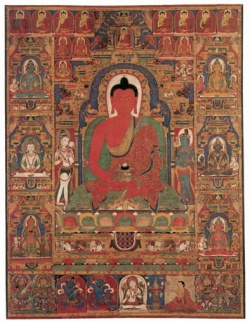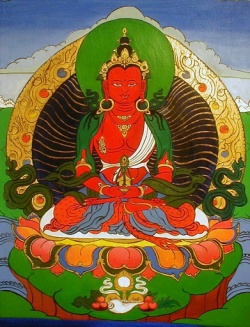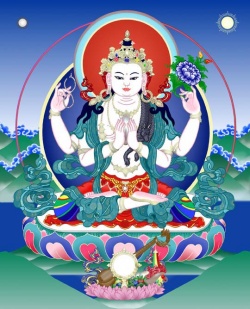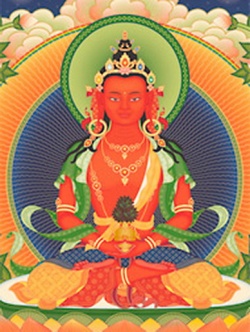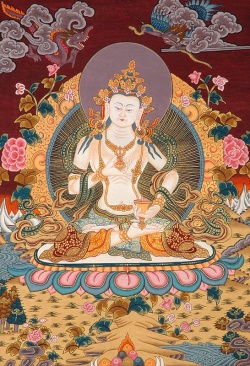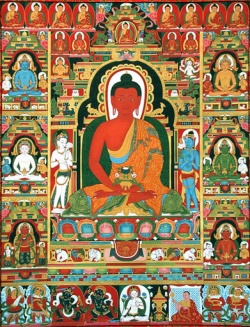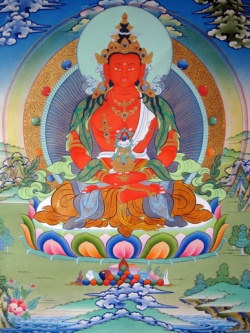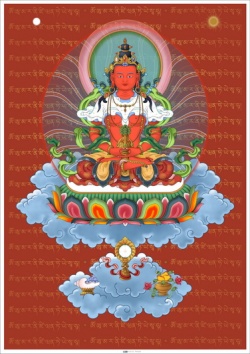Difference between revisions of "Upadeśa on the Sūtra of Amitāyus Buddha"
m (Text replacement - "the dharma" to "the dharma") |
m (Text replacement - "the Dharma" to "the Dharma") |
||
| Line 52: | Line 52: | ||
[[Heard]] by all [in [[worlds]]] in the [[ten directions]]. | [[Heard]] by all [in [[worlds]]] in the [[ten directions]]. | ||
[[Amitāyus]], the [[Samyak-Saṁbuddha]], | [[Amitāyus]], the [[Samyak-Saṁbuddha]], | ||
| − | Is [[ | + | Is the [[Dharma]] [[King]] who well presides there. |
The [[pure]] multitudes who accompany that [[Tathāgata]] are | The [[pure]] multitudes who accompany that [[Tathāgata]] are | ||
Miraculously [[reborn]] there from [[flowers]] of true [[enlightenment]]. | Miraculously [[reborn]] there from [[flowers]] of true [[enlightenment]]. | ||
| Line 135: | Line 135: | ||
10. The [[virtues]] of its radiance are described by this [[stanza]]: “Like the {{Wiki|sun}}, [[Buddha wisdom]] is bright and [[pure]], / And it dispels the darkness of the [[ignorance]] of the [[world]].” | 10. The [[virtues]] of its radiance are described by this [[stanza]]: “Like the {{Wiki|sun}}, [[Buddha wisdom]] is bright and [[pure]], / And it dispels the darkness of the [[ignorance]] of the [[world]].” | ||
11. The [[virtues]] of its {{Wiki|sounds}} are described by this [[stanza]]: “[[Brahma]] tones reach far and wide, / [[Heard]] by all [in [[worlds]]] in the [[ten directions]].” | 11. The [[virtues]] of its {{Wiki|sounds}} are described by this [[stanza]]: “[[Brahma]] tones reach far and wide, / [[Heard]] by all [in [[worlds]]] in the [[ten directions]].” | ||
| − | 12. The [[virtues]] of its [[master]] are described by this [[stanza]]: “[[Amitāyus]], the [[Samyak-Saṁbuddha]], / Is [[ | + | 12. The [[virtues]] of its [[master]] are described by this [[stanza]]: “[[Amitāyus]], the [[Samyak-Saṁbuddha]], / Is the [[Dharma]] [[King]] who well presides there.” |
13. The [[virtues]] of its [[master’s]] retinue are described by this [[stanza]]: “The [[pure]] multitudes who accompany that [[Tathāgata]] are / Miraculously [[reborn]] there from [[flowers]] of true [[enlightenment]].” | 13. The [[virtues]] of its [[master’s]] retinue are described by this [[stanza]]: “The [[pure]] multitudes who accompany that [[Tathāgata]] are / Miraculously [[reborn]] there from [[flowers]] of true [[enlightenment]].” | ||
[[File:Amitayus47.jpg|thumb|250px|]] | [[File:Amitayus47.jpg|thumb|250px|]] | ||
| Line 165: | Line 165: | ||
2. Their [[manifested]] response [[bodies]], with one [[mind]] and one [[thought]], emit great radiance, simultaneously reaching everywhere in [[worlds]] in the [[ten directions]], [[teaching]] and [[transforming]] [[sentient beings]]. By various [[skillful means]], they train through their work to end the [[suffering]] of all [[sentient beings]], as described by this [[stanza]]: “Their immaculate majestic radiance, / With one [[thought]], / Simultaneously illuminates all [[Buddha]] assemblies and / Benefits all [[sentient beings]].” | 2. Their [[manifested]] response [[bodies]], with one [[mind]] and one [[thought]], emit great radiance, simultaneously reaching everywhere in [[worlds]] in the [[ten directions]], [[teaching]] and [[transforming]] [[sentient beings]]. By various [[skillful means]], they train through their work to end the [[suffering]] of all [[sentient beings]], as described by this [[stanza]]: “Their immaculate majestic radiance, / With one [[thought]], / Simultaneously illuminates all [[Buddha]] assemblies and / Benefits all [[sentient beings]].” | ||
3. They [[illuminate]] the multitudes in [[Buddha]] assemblies in all lands without exception, make innumerable expansive [[offerings]], and revere and praise Buddha-Tathāgatas, as described by this [[stanza]]: “As an [[offering]], they rain down / [[Celestial]] {{Wiki|music}}, [[flowers]], garments, and wonderful [[incense]]. / Without the discriminatory [[mind]], / They praise [[Buddhas]]’ [[virtues]].” | 3. They [[illuminate]] the multitudes in [[Buddha]] assemblies in all lands without exception, make innumerable expansive [[offerings]], and revere and praise Buddha-Tathāgatas, as described by this [[stanza]]: “As an [[offering]], they rain down / [[Celestial]] {{Wiki|music}}, [[flowers]], garments, and wonderful [[incense]]. / Without the discriminatory [[mind]], / They praise [[Buddhas]]’ [[virtues]].” | ||
| − | 4. In all [[worlds]] in the [[ten directions]], where the [[Three Jewels]] are unavailable, they preside over the great ocean of [[virtues]] of the [[Buddha]], [[ | + | 4. In all [[worlds]] in the [[ten directions]], where the [[Three Jewels]] are unavailable, they preside over the great ocean of [[virtues]] of the [[Buddha]], the [[Dharma]], and the [[Saṅgha]], enabling all to understand [the [[Buddha Dharma]]] and to train in accord with true [[reality]], as described by this [[stanza]]: “In any land without / The [[Buddha Dharma]], the [[jewel]] of [[virtues]], / They wish to be [[reborn]], / To impart the [[Buddha Dharma]] as do [[Buddhas]].” |
Integrating All [[Virtues]] into One [[Word]] | Integrating All [[Virtues]] into One [[Word]] | ||
| − | As stated above, one should [[visualize]], as adornments, the [[virtues]] of that [[Buddha]] Land’s achievements, the [[virtues]] of [[Amitāyus]] [[Buddha’s]] achievements, and the [[virtues]] of His [[Bodhisattvas]]’ achievements. [[Visualization]] of these three groups of [[virtues]] adorns one’s [[mind]] that wishes for [[rebirth]] [in that land]. Now I integrate all [[virtues]] into one [[Dharma]] [[word]]. This one [[Dharma]] [[word]] is [[purity]]. The [[word]] [[purity]] pertains to true [[wisdom]], the [[dharma]] [[body]], which is [[asaṁskṛta]]. This [[purity]] has two meanings. What are these two? One is the [[purity]] of the vessel [[world]]; the other is the [[purity]] of the [[sentient beings]]’ [[world]]. The [[virtues]] of the seventeen achievements of that [[Buddha Land]], as its adornments, are called the [[purity]] of the vessel [[world]]. The [[virtues]] of the eight achievements of that [[Buddha]], as His adornments, and the [[virtues]] of the four achievements of [[Bodhisattvas]], as their adornments, are called the [[purity]] of the [[sentient beings]]’ [[world]]. [[Thus]], [[ | + | As stated above, one should [[visualize]], as adornments, the [[virtues]] of that [[Buddha]] Land’s achievements, the [[virtues]] of [[Amitāyus]] [[Buddha’s]] achievements, and the [[virtues]] of His [[Bodhisattvas]]’ achievements. [[Visualization]] of these three groups of [[virtues]] adorns one’s [[mind]] that wishes for [[rebirth]] [in that land]. Now I integrate all [[virtues]] into one [[Dharma]] [[word]]. This one [[Dharma]] [[word]] is [[purity]]. The [[word]] [[purity]] pertains to true [[wisdom]], the [[dharma]] [[body]], which is [[asaṁskṛta]]. This [[purity]] has two meanings. What are these two? One is the [[purity]] of the vessel [[world]]; the other is the [[purity]] of the [[sentient beings]]’ [[world]]. The [[virtues]] of the seventeen achievements of that [[Buddha Land]], as its adornments, are called the [[purity]] of the vessel [[world]]. The [[virtues]] of the eight achievements of that [[Buddha]], as His adornments, and the [[virtues]] of the four achievements of [[Bodhisattvas]], as their adornments, are called the [[purity]] of the [[sentient beings]]’ [[world]]. [[Thus]], the [[Dharma]] [[word]] [[purity]] encompasses these two meanings. |
The Fifth Training Door | The Fifth Training Door | ||
[[File:Amitayus50.JPG|thumb|250px|]] | [[File:Amitayus50.JPG|thumb|250px|]] | ||
| Line 174: | Line 174: | ||
How does a [[Bodhisattva]] skillfully [[transfer]] his [[merits]]? He transfers all [[roots]] of [[virtue]] gathered from the five trainings3 [mentioned above], including making obeisance. Not seeking his own lasting [[happiness]], but for the sake of uprooting the [[suffering]] of all [[sentient beings]], he makes a wish to draw in all [[sentient beings]] for them to be [[reborn]] in that [[Buddha Land]] of [[Peace]] and [[Bliss]]. This is called a [[Bodhisattva’s]] achievement of [[skillful]] transference of his [[merits]]. | How does a [[Bodhisattva]] skillfully [[transfer]] his [[merits]]? He transfers all [[roots]] of [[virtue]] gathered from the five trainings3 [mentioned above], including making obeisance. Not seeking his own lasting [[happiness]], but for the sake of uprooting the [[suffering]] of all [[sentient beings]], he makes a wish to draw in all [[sentient beings]] for them to be [[reborn]] in that [[Buddha Land]] of [[Peace]] and [[Bliss]]. This is called a [[Bodhisattva’s]] achievement of [[skillful]] transference of his [[merits]]. | ||
[[Bodhisattvas]] who excel in such [[skillful]] transference of their [[merits]] will stay far away from [[dharmas]] that go against three [[bodhi]] doors. What are these three? First, relying on the door of [[wisdom]], one does not seek one’s own [[happiness]] because one stays far away from the [[mind]] captivated by one’s own [[body]]. Second, relying on the door of [[lovingkindness]] and [[compassion]], one uproots the [[suffering]] of all [[sentient beings]] because one stays far away from the [[mind]] indifferent to helping [[sentient beings]]. Third, relying on the door of [[skillful means]], one pities all [[sentient beings]] because one stays far away from the [[mind]] that pampers and worships one’s own [[body]]. This is called staying far away from [[dharmas]] that go against three [[bodhi]] doors. | [[Bodhisattvas]] who excel in such [[skillful]] transference of their [[merits]] will stay far away from [[dharmas]] that go against three [[bodhi]] doors. What are these three? First, relying on the door of [[wisdom]], one does not seek one’s own [[happiness]] because one stays far away from the [[mind]] captivated by one’s own [[body]]. Second, relying on the door of [[lovingkindness]] and [[compassion]], one uproots the [[suffering]] of all [[sentient beings]] because one stays far away from the [[mind]] indifferent to helping [[sentient beings]]. Third, relying on the door of [[skillful means]], one pities all [[sentient beings]] because one stays far away from the [[mind]] that pampers and worships one’s own [[body]]. This is called staying far away from [[dharmas]] that go against three [[bodhi]] doors. | ||
| − | [[Bodhisattvas]] who stay far away from [[dharmas]] that go against these three [[bodhi]] doors will acquire three fulfillments that accord with [[ | + | [[Bodhisattvas]] who stay far away from [[dharmas]] that go against these three [[bodhi]] doors will acquire three fulfillments that accord with the [[Dharma]] of these doors. What are these three fulfillments? First, the untainted [[pure mind]], because one does not seek one’s own [[happiness]]. Second, the [[peaceful]] [[pure mind]], because one uproots the [[suffering]] of all [[sentient beings]]. Third, the [[joyful]] [[pure mind]], because one draws in all [[sentient beings]] for them to be [[reborn]] in that [[Buddha Land]], enabling them to attain the great [[bodhi]]. These are the three fulfillments that accord with the [[Dharma]] of these three [[bodhi]] doors. |
Achieving [[Rebirth]] through the Five Training Doors | Achieving [[Rebirth]] through the Five Training Doors | ||
Revision as of 17:07, 12 September 2013
Composed by the Indian Master Vasubandhu
Translated from Sanskrit into Chinese in the Northern Wei Dynasty by
The Tripiṭaka Master Bodhiruci from India
The Stanzas of Wishing for Rebirth
World-Honored One,
I single-mindedly take refuge in
The Tathāgata [[[Amitāyus]]], whose hindrance-free light shines in the ten directions,
Wishing to be reborn in His Land of Peace and Bliss.
Following sūtras,
The appearances of true virtue,
I pronounce these all-encompassing stanzas of wishing,
In accordance with the teachings of the Buddha [[[Śākyamuni]]].
I visualize the appearance of that land,
Which surpasses that of the path within the Three Realms of Existence.
It is ultimate, like the open sky,
Vast and boundless.
It is born from great lovingkindness and compassion on the right path,
And from supra-worldly roots of goodness.
It is full of pure radiance,
Like a mirror, the disk of the sun or the moon.
It is made of treasures and
Abounds with wonderful adornments.
The immaculate light glows,
Suffusing all lands with radiance and purity.
The grasses of virtue, made of treasures, are soft,
Twirling left and right.
They bring superb joy to those who touch them,
More than the kācalindi grass does.
Tens of millions kinds of jeweled flowers
Cover the ponds and streams.
As breezes stir the flower petals,
Interweaving beams of light freely whirl.
Palaces and towers
Command a hindrance-free view in the ten directions.
Surrounded by jeweled railings,
Diverse trees emit colorful beams of light.
Nets of innumerable interlaced jewels
Hover all across the open sky.
All kinds of bells
Chime wondrous Dharma tones.
As adornments, flowers and garments fall like rain;
innumerable fragrances waft everywhere.
Like the sun, Buddha wisdom is bright and pure,
And it dispels the darkness of the ignorance of the world.
Brahma tones reach far and wide,
Heard by all [in worlds] in the ten directions.
Amitāyus, the Samyak-Saṁbuddha,
Is the Dharma King who well presides there.
The pure multitudes who accompany that Tathāgata are
Miraculously reborn there from flowers of true enlightenment.
They delight in the flavors of the Buddha Dharma,
Taking dhyāna and samādhi as food.
Having forever left the troubles of body and mind,
They experience uninterrupted bliss.
The roots of goodness in the Mahāyāna domain
Are equal, with no scornful names,
Because no one is reborn there in female form, or with incomplete faculties,
Or as the character-type bent on riding the Two Vehicles.
All wishes and preferences of the sentient beings there
Are fulfilled.
Therefore, I wish to be reborn
In Amitāyus Buddha’s land.
Innumerable superb treasures
Adorn [His seat] the wonderful, pure flower-platform.
The radiance of His excellent appearance reaches a distance of one yojana.
His form surpasses those of all sentient beings.
That Tathāgata’s wondrous sounds are Brahma tones,
Heard by all [in worlds] in the ten directions.
As earth, water, fire, wind, and space make no differentiations,
So does He not make them.
There, gods and those who cannot be diverted [from the right path]
Are reborn from the ocean of pure wisdom.
Like Sumeru, king of mountains,
Their magnificence is unsurpassed.
Multitudes in male form, including gods,
Reverently surround Him and gaze at Him.
By virtue of the power of that Buddha’s original vows,
One’s encounter with Him will never be fruitless.
One will be enabled to encompass
The great treasure ocean of virtues.
The Land of Peace and Bliss is pure,
Where the stainless Dharma wheel always turns.
Firm as Mount Sumeru, magically manifested Buddhas and Bodhisattvas
Abide there like the sun.
Their immaculate majestic radiance,
With one thought,
Simultaneously illuminates all Buddha assemblies
And benefits all sentient beings.
As an offering, they rain down
Celestial music, flowers, garments, and wonderful incense.
Without the discriminatory mind,
They praise Buddhas’ virtues.
In any land without
The Buddha Dharma, the jewel of virtues,
They wish to be reborn,
To impart the Buddha Dharma as do Buddhas.
I compose this treatise with stanzas,
Wishing to see Amitāyus Buddha and
To be reborn together with all sentient beings
In the Land of Peace and Bliss.
Thus, I have summarized in stanzas the words in the Sūtra of Amitāyus Buddha.
The Explanation
What is the meaning of these stanzas of wishing? It indicates [how to] visualize the Land of Peace and Bliss and to visualize Amitāyus Buddha, for those who wish to be reborn in that land.
The Five Training Doors
How does one visualize? How does one elicit belief? If good men and good women come to achievement through the five doors of vigilance, they will be reborn in the Land of Peace and Bliss, and see Amitāyus Buddha. What are the five doors of vigilance? The first door is making obeisance; the second door is praising; the third door is wishing; the fourth door is visualizing; the fifth door is transferring merit.
Why does one make obeisance? To express the intention to be reborn in that land, one should do the body karma of making obeisance to Amitāyus Tathāgata, the Arhat, Samyak-Saṁbuddha. How does one praise Him? To train in accord with true reality, one should do the voice karma of praising, by saying that Tathāgata’s name, because His name and its meaning are like His radiance and wisdom appearance. What does one wish for? To train in śamatha in accord with true reality, one should do the mind karma of wishing, by single-mindedly thinking of one’s rebirth in the Land of Peace and Bliss. How does one visualize? To train in vipaśyanā in accord with true reality, one should visualize with wisdom and right thinking. There are three visualizations. First, one visualizes the virtues of that Buddha Land as its adornments. Second, one visualizes the virtues of Amitāyus Buddha as His adornments. Third, one visualizes the virtues of the Bodhisattvas there as their adornments. How does one transfer one’s merits? To invoke the mind of great compassion, one should never abandon any suffering sentient being. One should transfer one’s merits to others with this foremost wish for all to be reborn in that land.
The Fourth Training Door
Visualizing the Virtues of That Buddha Land
How does one visualize the virtues of that Buddha Land as its adornments? The virtues adorning that Buddha Land command inconceivable powers, similar to but different from those of the precious wish-fulfilling jewel. One should visualize, as its adornments, the virtues of seventeen achievements of that Buddha Land.
First, the virtues of its purity; second, the virtues of its measure; third, the virtues of its nature; fourth, the virtues of its form; fifth, the virtues of its various things; sixth, the virtues of its wonderful colors; seventh, the virtues of its touch; eighth, the virtues of its adornments; ninth, the virtues of its rain; tenth, the virtues of its radiance; eleventh, the virtues of its wonderful sounds; twelfth, the virtues of its master; thirteen, the virtues of its master’s retinue; fourteenth, the virtues of the enjoyment of its inhabitants; fifteenth, the virtues of its no tribulations; sixteenth, the virtues of its door of great meaning; seventeenth, the virtues of its fulfillment of all wishes.
1. The virtues of its purity are described by this stanza: “I visualize the appearance of that land, / Which surpasses that of the path within the Three Realms of Existence.”
2. The virtues of its measure are described by this stanza: “It is ultimate, like the open sky, / Vast and boundless.”
3. The virtues of its nature are described by this stanza: “It is born from great lovingkindness and compassion on the right path, / And from supra-worldly roots of goodness.”
4. The virtues of its form are described by this stanza: “It is full of pure radiance, / Like a mirror, the disk of the sun or the moon.”
5. The virtues of its various things are described by this stanza: “It is made of treasures and / Abounds with wonderful adornments.”
6. The virtues of its wonderful colors are described by this stanza: “The immaculate light glows, / Suffusing all lands with radiance and purity.”
7. The virtues of its touch are described by this stanza: “The grasses of virtue, made of treasures, are soft, / Twirling left and right. / They bring superb joy to those who touch them, / More than the kācalindi grass does.”
8. What are the virtues of its adornments? Know the three things that are adorned. What are these three? The first is its water; the second is its ground; the third is its sky. The adornments of its water are described by this stanza: “Tens of millions kinds of jeweled flowers / Cover the ponds and streams. / As breezes stir the flower petals, / Interweaving beams of light freely whirl.” The adornments of its ground are described by this stanza: “Palaces and towers / Command a hindrance-free view in the ten directions. / Surrounded by jeweled railings, / Diverse trees emit colorful beams of light.” The adornments of its sky are described by this stanza: “Nets of innumerable interlaced jewels / Hover all across the open sky. / All kinds of bells / Chime wondrous Dharma tones.”
9. The virtues of its rain are described by this stanza: “As adornments, flowers and garments fall like rain; / innumerable fragrances waft everywhere.”
10. The virtues of its radiance are described by this stanza: “Like the sun, Buddha wisdom is bright and pure, / And it dispels the darkness of the ignorance of the world.”
11. The virtues of its sounds are described by this stanza: “Brahma tones reach far and wide, / Heard by all [in worlds] in the ten directions.”
12. The virtues of its master are described by this stanza: “Amitāyus, the Samyak-Saṁbuddha, / Is the Dharma King who well presides there.”
13. The virtues of its master’s retinue are described by this stanza: “The pure multitudes who accompany that Tathāgata are / Miraculously reborn there from flowers of true enlightenment.”
14. The virtues of the enjoyment of its inhabitants are described by this stanza: “They delight in the flavors of the Buddha Dharma, / Taking dhyāna and samādhi as food.”
15. The virtues of its no tribulations are described by this stanza: “Having forever left the troubles of body and mind, / They experience uninterrupted bliss.”
16. The virtues of its door of great meaning are described by this stanza: “The roots of goodness in the Mahāyāna domain / Are equal, with no scornful names, / Because no one is reborn there in female form, or with incomplete faculties, / Or as the character-type bent on riding the Two Vehicles.” One’s rebirth in the Pure Land, as one’s requital fruit, is free from the faults of two kinds of scorn. One is body, the other is name. There are three kinds of [faulty] bodies: riders of the Two Vehicles, females, and people with incomplete faculties. Freedom from these three faults is called freedom from the scorned bodies. Their three corresponding names are riders of the Two Vehicles, females, and people with incomplete faculties. [In that land] these three kinds of bodies do not even exist, much less have their names heard of. This is called freedom from scornful names. Equality [of roots of goodness] means that all [inhabitants there] are equal in the one appearance.1
17. The virtues of its fulfillment of all wishes are described by this stanza: “All wishes and preferences of the sentient beings there / Are fulfilled.”
These are brief explanations of the virtues of the seventeen achievements adorning Amitāyus Buddha’s land. These virtues indicate that Tathāgata’s achievements in benefiting Himself and others. The adornments of Amitāyus Buddha’s land are the appearances of the wondrous state of the highest truth. The first achievement [of generality] and its following sixteen achievements [of particulars] have been successively described.
Visualizing the Virtues of That Buddha
How does one visualize the virtues of that Buddha’s achievements as His adornments? That Buddha has eight kinds of adornments. What are these eight? First, the adornments of His seat; second, the adornments of His body; third, the adornments of His voice; fourth, the adornments of His mind; fifth, the adornments of His people; sixth, the adornments of the leaders of His retinue; seventh, the adornments of His status as the master; eighth, the adornments of His authority as the presiding teacher.
1. What are the adornments of His seat? This stanza explains, “Innumerable superb treasures / Adorn [His seat] the wonderful, pure flower-platform.”
2. What are the adornments of His body? This stanza explains, “The radiance of His excellent appearance reaches a distance of one yojana. / His form surpasses those of all sentient beings.”
3. What are the adornments of His voice? This stanza explains, “That Tathāgata’s wondrous sounds are Brahma tones, / Heard by all [in worlds] in the ten directions.”
4. What are the adornments of His mind? This stanza explains, “As earth, water, fire, wind, and space make no differentiations, / So does He not make them.” Making no differentiation means that He does not have the discriminatory mind.
5. What are the adornments of His people? This stanza explains, “There, gods and those who cannot be diverted [from the right path] / Are reborn from the ocean of pure wisdom.”
6. What are the adornments of the leaders of His retinue? This stanza explains, “Like Sumeru, king of mountains, / Their magnificence is unsurpassed.”
7. What are the adornments of His status as the master? This stanza explains, “Multitudes in male form, including gods, / Reverently surround Him and gaze at Him.”
8. What are the adornments of His authority as the presiding teacher? This stanza explains, “By virtue of the power of that Buddha’s original vows, / One’s encounter with Him will never be fruitless. / One will be enabled to encompass / The great treasure ocean of virtues.” Bodhisattvas who have not realized the pure mind, but have seen that Buddha, will eventually realize the dharma body, which is equal in all, just as Bodhisattvas with the pure mind2 and Bodhisattvas on higher Grounds will eventually attain nirvāṇa and realize that it is equal in all.
This is a brief explanation of the eight phrases which successively indicate how that Tathāgata is adorned by the virtues of His achievements in benefiting Himself and others.
Visualizing the Virtues of the Bodhisattvas There
How does one visualize, as their adornments, the virtues of the Bodhisattvas’ achievements? Bodhisattvas there have the virtues of four achievements in their right training. What are these four?
1. With their bodies staying put in one Buddha Land, they responsively manifest their bodies everywhere [in worlds] in the ten directions. Training themselves in accord with true reality, they always do Buddha work. They open sentient beings’ minds like flowers rising above mud, as described by this stanza: “The Land of Peace and Bliss is pure, / Where the stainless Dharma wheel always turns. / Firm as Mount Sumeru, magically manifested Buddhas and Bodhisattvas / Abide there like the sun.”
2. Their manifested response bodies, with one mind and one thought, emit great radiance, simultaneously reaching everywhere in worlds in the ten directions, teaching and transforming sentient beings. By various skillful means, they train through their work to end the suffering of all sentient beings, as described by this stanza: “Their immaculate majestic radiance, / With one thought, / Simultaneously illuminates all Buddha assemblies and / Benefits all sentient beings.”
3. They illuminate the multitudes in Buddha assemblies in all lands without exception, make innumerable expansive offerings, and revere and praise Buddha-Tathāgatas, as described by this stanza: “As an offering, they rain down / Celestial music, flowers, garments, and wonderful incense. / Without the discriminatory mind, / They praise Buddhas’ virtues.”
4. In all worlds in the ten directions, where the Three Jewels are unavailable, they preside over the great ocean of virtues of the Buddha, the Dharma, and the Saṅgha, enabling all to understand [the Buddha Dharma] and to train in accord with true reality, as described by this stanza: “In any land without / The Buddha Dharma, the jewel of virtues, / They wish to be reborn, / To impart the Buddha Dharma as do Buddhas.”
Integrating All Virtues into One Word
As stated above, one should visualize, as adornments, the virtues of that Buddha Land’s achievements, the virtues of Amitāyus Buddha’s achievements, and the virtues of His Bodhisattvas’ achievements. Visualization of these three groups of virtues adorns one’s mind that wishes for rebirth [in that land]. Now I integrate all virtues into one Dharma word. This one Dharma word is purity. The word purity pertains to true wisdom, the dharma body, which is asaṁskṛta. This purity has two meanings. What are these two? One is the purity of the vessel world; the other is the purity of the sentient beings’ world. The virtues of the seventeen achievements of that Buddha Land, as its adornments, are called the purity of the vessel world. The virtues of the eight achievements of that Buddha, as His adornments, and the virtues of the four achievements of Bodhisattvas, as their adornments, are called the purity of the sentient beings’ world. Thus, the Dharma word purity encompasses these two meanings.
The Fifth Training Door
Bodhisattvas who broadly or simply train in śamatha and vipaśyanā [through the third and fourth doors] will achieve the gentle mind and will truly know dharmas in their broad or simple aspects. Thus, they will achieve skillful transference of their merits.
How does a Bodhisattva skillfully transfer his merits? He transfers all roots of virtue gathered from the five trainings3 [mentioned above], including making obeisance. Not seeking his own lasting happiness, but for the sake of uprooting the suffering of all sentient beings, he makes a wish to draw in all sentient beings for them to be reborn in that Buddha Land of Peace and Bliss. This is called a Bodhisattva’s achievement of skillful transference of his merits.
Bodhisattvas who excel in such skillful transference of their merits will stay far away from dharmas that go against three bodhi doors. What are these three? First, relying on the door of wisdom, one does not seek one’s own happiness because one stays far away from the mind captivated by one’s own body. Second, relying on the door of lovingkindness and compassion, one uproots the suffering of all sentient beings because one stays far away from the mind indifferent to helping sentient beings. Third, relying on the door of skillful means, one pities all sentient beings because one stays far away from the mind that pampers and worships one’s own body. This is called staying far away from dharmas that go against three bodhi doors.
Bodhisattvas who stay far away from dharmas that go against these three bodhi doors will acquire three fulfillments that accord with the Dharma of these doors. What are these three fulfillments? First, the untainted pure mind, because one does not seek one’s own happiness. Second, the peaceful pure mind, because one uproots the suffering of all sentient beings. Third, the joyful pure mind, because one draws in all sentient beings for them to be reborn in that Buddha Land, enabling them to attain the great bodhi. These are the three fulfillments that accord with the Dharma of these three bodhi doors.
Achieving Rebirth through the Five Training Doors
The three bodhi doors mentioned above—wisdom, lovingkindness and compassion, and skillful means—lead to prajñā, and prajñā reveals skillful means. The three dharmas mentioned above—staying far away from the mind captivated by one’s own body, staying far away from the mind indifferent to helping sentient beings, and staying far away from the mind that pampers and worships one’s own body—enable one to stay far way from hindrances to realizing the bodhi mind. The three minds mentioned above—the untainted pure mind, the peaceful pure mind, and the joyful pure mind—merge into one, the wondrous, joyful, superb true mind.
Thus, with the wisdom mind, the skillful-means mind, the hindrance-free mind, and the superb true mind, Bodhisattvas can be reborn in a pure Buddha Land. This is the achievement of Bodhisattvas who go through the five Dharma Doors [making obeisance, praising, wishing, visualizing, and transferring merit] mentioned above. By training through these Dharma Doors, a Bodhisattva’s body karmas, voice karmas, mind karmas, visualization-with-wisdom karmas, and skillful merit-transference-with-wisdom karmas are easily accomplished.
The Five Achievement Doors
There are another five doors, though which one can successively achieve five virtues. What are these five [achievement] doors? First, the near door; second, the door to the great assembly; third, the door to the residence; fourth, the door to the house; and fifth, the door to the playground in the garden. Through the first four of these five doors, one achieves the virtue of entrance; through the fifth door, one achieves the virtue of exit.
One enters the first door by making obeisance to Amitāyus Buddha in order to be reborn in His land. One’s rebirth in the Land of Peace of Bliss is called entering the near door. One enters the second door by praising Amitāyus Buddha, saying that Tathāgata’s name in accordance with the meaning of His name. Through training in thinking of that Tathāgata’s radiance, one can join the multitudes in the great assembly. This is called entering the door to the great assembly. One enters the third door by single-mindedly wishing to be reborn there. Through training in śamatha and silent samādhi, one can enter the World of the Lotus Flower Store.4 This is called entering the door to the residence. One enters the fourth door by intently visualizing the wonderful adornments [of that land, that Buddha, and the Bodhisattvas there]. Through training in vipaśyanā, one arrives there and enjoys the bliss of various Dharma flavors. This is called entering the door to the house.
One exits the fifth door with great lovingkindness and compassion by visualizing all suffering sentient beings, by responsively manifesting one’s bodies, by returning to the forest of afflictions in the garden of saṁsāra, and by playfully demonstrating transcendental powers. One’s arrival on the teaching ground, because one has transferred one’s merits with the power of one’s original vows, is called exiting the door to the playground in the garden.
A Bodhisattva’s entrance through the first four doors is an achievement for self-benefit. A Bodhisattva’s exit through the fifth door to benefit others is an achievement of transferring his merits. Bodhisattvas who train through these five [achievement] doors to benefit themselves and others will quickly attain anuttara-samyak-saṁbodhi.
Thus ends, in this Upadeśa on the Sūtra of Amitāyus Buddha, the explanation of the stanzas of wishing for rebirth.
—Upadeśa on the Sūtra of Amitāyus Buddha
Translated from the digital Chinese Canon (T26n1524)
Notes
1. In Sūtra 25, the Buddha says that the inhabitants there “all appear in the same form, without any difference.” Furthermore, according to the absolute truth, all appearances are equal in the one appearance of true suchness.
2. Bodhisattvas with the pure mind are those who have ascended to the First Ground.
3. Perhaps Vasubandhu means the first four of the five trainings. (
4. Vasubandhu refers to Amitāyus Buddha’s Land of Peace and Bliss as the World of the Lotus Flower Store. This world has different meanings in the Brahma Net Sūtra (T24n1484) and in the 80-fascicle version of the Mahāvaipulya Sūtra of Buddha Adornment (T10n0279).
